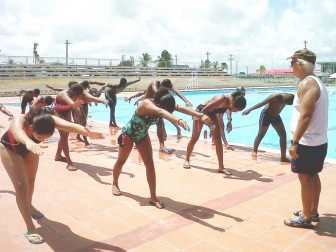Over 20 individuals participated in the International Swimming Federation (FINA) coaches clinic conducted by international swimming coach Rick Powers at the National Aquatic Centre (NAC).
In keeping with the norm of hosting a developmental clinic conducted by a FINA official, the clinic was facilitated by the Guyana Amateur Swimming Association.

The clinic, which ran from August 22 – 31, involved practical sessions in the mornings at the NAC where the participants were given the chance to work alongside some of the swimmers.
Theoretical training was done in the evening sessions at Olympic House.
“We covered everything from how to teach lessons to beginners, because we have several swimming instructors here who are not actually coaching as yet so they needed to get something that was useful for them to take back from this clinic, so we covered from the very basic into stroke drills, the turns, we talked about physiology of training, energy systems, how to plan a season how to prepare the swimmers for the final two weeks before a major competition, we talked about how to motivate the swimmers, there were basically enough topics to keep busy for almost two weeks,” Powers explained.
Powers has been conducting FINA clinics across the world for the past 18 years. He said that the training programme was one adapted for the state of swimming that Guyana is at, noting that having a 50m pool was a great advantage for Guyana.
“Each country is different, each situation is different, the level of swimming is different, and so what I would do when I contact a country is I would ask some questions so I get a kind of a feel for what the level of swimming is, then I adjust whatever the course may be according to the local conditions, you have to be really flexible about these things and you adapt because that’s all you can do. Here you guys are fortunate because you have that new complex with the 50m pool, you have a bunch of interested coaches and talented swimmers,” the level five FINA coach said.
Those who participated in the programme received participation certificates in a modest closing ceremony at the Olympic House while Powers gave a brief presentation to parents and other individuals, on how to officiate swim meets at the NAC.
Having conducted training clinics in over 40 countries, Powers conveyed his eagerness to return to Guyana, estimating notable progress in the development of swimming in Guyana in the coming years.
“I think that in the next couple of years there’s going to be great improvement in swimming here. FINA recognizes that there is some swimming going on and FINA would like to help to stimulate and give them some support especially now that they’ve built the 50m pool, which gives you more conditions to improve the level of swimming because before you never really had a facility that was adequate.”
According to Powers he based his assessment largely on the talent he saw in some of the swimmers who were apart of the clinic.
“It’s just about the swimmers, basically you take a group of swimmers in the water you run them through some drills, you run them through some training and you see what their response is, and immediately you can see from the way they swim who the talented ones are. Sometimes you go to a clinic and you won’t find anyone who’s talented, but there were three or four kids who looked to me to have talent and now it just depends on the coaches and the country giving support.”
Over 30 years of coaching experience, Powers did not fail to point out that there are shortcomings that impede swimmers in Guyana from reaching their full potential, even with the 50m pool.
“One of the major problems you have in a country like Guyana is that you’re isolated, your swimmers need to compete and they need to compete often. The only way you learn to be successful in competitions is by having more competitions. If you end up having a swimmer who is really talented that swimmer eventually has to leave Guyana and he has to go train somewhere else because there will be no more challenges for that swimmer here. A swimmer has to be challenged on a daily basis, he has to have somebody pushing him, if you get to the point where you’re so good, where you’re so much better than everybody else, locally, you’re the big fish in the little pond, (and) so you don’t push yourself anymore,” Powers asserted.
Powers further indicated the need for the talent to be backed by substantial support.
“If you don’t have financial support and the swimmers are not able to go to competitions on a regular basis there’s not going to be much improvement and so this is going to be the next hurdle to find financial support and if that doesn’t happen there’s not going to be much progress – in any sport. Here when a swimmer gets to a certain age here he’s going to have to dedicate himself to studying and working and looking at his future.” Powers said.





